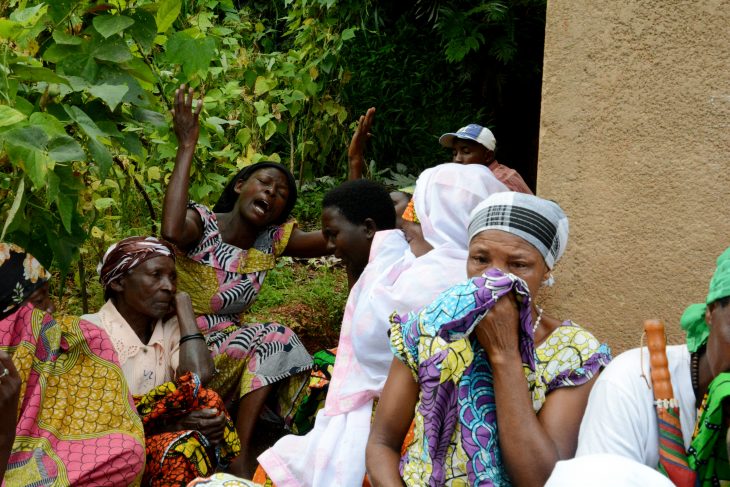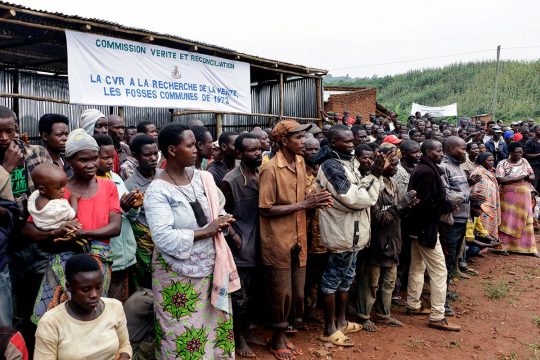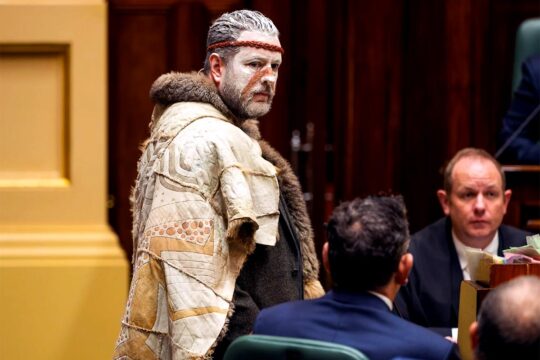In March 2016, after a series of visits by high-level international emissaries (UN, AU, etc.), all the Burundian officials I heard on the ground were expressing satisfaction, saying peace had been restored and the political situation normalized. They based this on three claims:
“Order has been restored in all parts of the capital”
“The terrorist forces have been wiped out”
“We have massive support from the Burundian population”.
If they are to be believed, crisis resolution is well under way:
“All the institutions are now in place and working normally”
“We have set up a forum for dialogue [the National Commission for Inter-Burundian Dialogue] and are tackling the root causes of our problems [Truth and Reconciliation Commission]”.
The logical corollaries now become inevitable:
“At this point, there is nothing to negotiate”
“If opponents join the national dialogue, nobody has any intention of making concessions to them, except perhaps in the second half of the mandate, in the run-up to the next elections”.
This position reflects the position of strength in which the authorities believe themselves to be.
Internal and external opposition weakened
Indeed, there are several elements that point to the extreme weakness of the opposition which has been reduced to silence and/or hunted down inside the country, and the incapacity of the opposition abroad to influence what is happening nationally. Several months after the creation of CNARED (National Council for Respect of the Arusha Accords for Peace and Reconciliation), its leaders have still not managed to bring together all its components or to speak with one voice. This winter’s determined talk of a “return to Bujumbura for Christmas” is no longer credible and the exiles are now faced with many mundane problems both on a personal level (income, security of “vacant property”) and with regard to political efficiency. Such things help to explain the reintegration of “repentant” dissidents, and the back and forth of opposition figures.
Numerous pieces of information also confirm that active support to the “resistance” from the Rwandan authorities at the beginning of the crisis has now turned to deep disappointment given the lack of organization among various groups of civilians and soldiers exiled in Rwanda. Faced with a lack of clear leadership and political direction, Rwanda now seems to favour a strategy of isolating and weakening its neighbour rather than its initial interventionist policy.
We should also note that after the assassination on August 2, 2015 of General Adolphe Nshimirimana, a failed attack on army chief of staff General Prime Niyongabo on September 11 marked the end of commando operations against top dignitaries of the regime. In the same way, the spectacular (but without lasting impact) December 11 attack on military barracks shows once again the permeability of defence force installations. But it demonstrates above all how futile it is to carry out operations of uncertain impact with no coordinated strategy.
Today most of the attacks and aggressions show how banal violence has become in a context of impunity where young people hunted as “terrorists” carry out almost suicidal acts of hatred and vengeance. Everything therefore indicates that the collapse of the resistance movement, the powerlessness of its leaders and the demoralization of internal and external activists are durable factors.
More power to the security forces
So order has been restored for the most part in Bujumbura, and this achievement should not be under-estimated. The policy of boosting the organs of repression – intelligence, control, communication and “professionalization” of methods – has clearly paid off. The aim is, in particular, that the bosses of the National Intelligence and Police services raise themselves as soon as possible to “Rwandan standards”, ensuring coordination across the country between the intelligence and police forces and local militia.
But the policy of “catching up” with Rwanda on State repression has not stopped there. It also includes scrapping public freedoms and taking over institutions. Independent media have been shut down, the main civil society organizations dissolved, opposition party activities banned or their leaderships co-opted by the authorities, judicial authorities kept in check and parliamentary sessions dominated by the majority. It should be noted that the President of the National Assembly is also the President of the ruling CNDD-FDD party.
The progress is such that some leaders of the CNDD-FDD say the “Burundi now being reshaped” is more stable and durable than the “Rwandan model” because of the “democratic legitimacy” of the authorities. “Military regimes have lasted 30 years, we will do better”: that is not so much a prediction but the expression of a tough will to stay in power at any cost.
But how real is control of the crisis when it necessitates a police grip on the whole country?
The limits of a high-risk strategy
First, on a political level, fear, discouragement, undifferentiated repression of the “demonstrators/opponents/ terrorists” and close surveillance of all citizens dissuade people from expressing themselves in public. And above all, poverty and the struggle for survival mean people have other priorities.
The population is in shock. After 30 years of military rule and 10 of civil war, they thought they had freed themselves from ethnic segregation and political privilege and believed they could finally enjoy lasting peace in a stable, democratic and pluralist environment. But it would be an insult to think the Burundian people would give up forever these advances paid for so dearly just because of a presidential team’s desire to stay in power beyond term limits.
This is even less likely given that concerns emerging during the aborted 2015 electoral campaign focused on the authorities’ failure to offer attractive economic and social prospects to young people. A year on, although there is no tangible result from this move by the “democrats”, the country has distinguished itself with a fall in exports, flight of capital, declining viability and upkeep of infrastructure (transport, power, health, etc.) and drastic reduction in social services. Burundi, ranked second poorest country in the world by the IMF in 2013 and 2014, distinguished itself again in 2015 by dropping to the poorest country slot, with a GDP of 315 dollars per inhabitant.
While the State concentrates almost all its scarce resources on strengthening security and paying State employees and tells the already hard-pressed people to prepare for a “return to the forest” to fight Rwanda and its local allies, we may well ask ourselves how long the authorities will be able to rely on the resilience of the rural masses.
This is why, outside the official speeches, senior managers of all political persuasions in central and local administration express their personal reservations and worries about the future. Similar words can be heard from many political and economic leaders who watch for the slightest shift in the delicate power balances between rival government structures.
There are similar question marks over Burundi’s diplomacy at regional and international level. The authorities portray themselves as exemplary on national sovereignty, standing firm in the face of international pressure. This argument tends to work in Africa, coming from a small country that claims to be victim of an international plot. But here again we may ask whether Burundi’s posturing is not quite what it seems, given the political strategizing on February 29 around a response during the visit of African Union leaders or to a joint communiqué the following week from leaders of the Anglican and Catholic churches.
Similarly, the solicitude of the UN Secretary General’s delegation did not stop the Security Council approving shortly afterwards the principle of sending an international police force. Finally, several regional institutions are currently on hold with some activities suspended pending a resolution of the Burundian crisis. It is Burundi the debate is centred on, whereas it is only marginally important in terms of big regional economic and political stakes, such as South Sudan’s admission to the East African Community (EAC), funding for corridors of access to the north and centre, the EAC leadership, airport hubs and inter-continental trade agreements. Or is that just a pretext in the global readjustment of the regional powers’ diplomacy in the face notably of Rwanda’s ambitions?
Given the current official positions of national players in the crisis, the future consequences of President Nkurunziza’s third mandate could, unless there is significant political opening, prove much more serious in future than they are at present.
This article is co-published in French on theconversation.com






